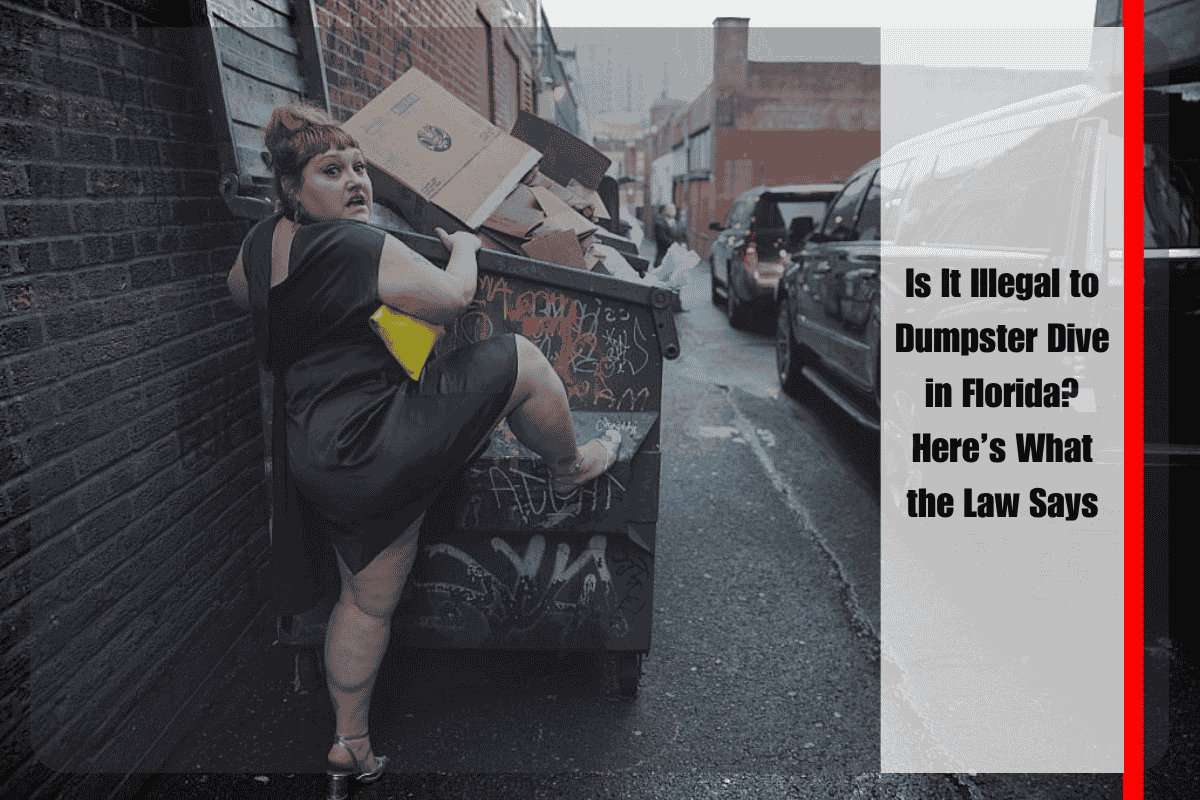Dumpster diving is a practice where individuals search through commercial or residential waste containers to find items they can use or repurpose. While it may seem like a way to save money or recycle, it’s important to know that dumpster diving may not always be legal, especially in states like Florida. If you’re curious about whether it’s legal or illegal to dumpster dive in Florida, it’s essential to understand the local laws that govern this activity.
Dumpster Diving Laws in Florida: The Basics
In Florida, the legality of dumpster diving depends on various factors such as the location, the property type, and whether you are trespassing or breaking any local ordinances. While there is no specific statewide law in Florida that directly bans dumpster diving, there are laws related to trespassing, theft, and property rights that can make it illegal in some situations.
Florida law prohibits people from trespassing on private property, and dumpster diving can be considered trespassing if you’re rummaging through a dumpster on someone else’s property without permission. This includes commercial dumpsters behind stores or residential trash bins placed on private property. If you dive into these dumpsters without permission, you could be charged with trespassing or loitering.
Trespassing Laws and Dumpster Diving
Florida’s trespassing laws are an important consideration for dumpster divers. According to Florida Statutes Section 810.08, if you enter or remain on someone’s property without their consent, it is considered trespassing. This can apply to people who dive into dumpsters located on private property, such as those behind businesses or at private residences. Even if the dumpster is left in a public area, entering it without permission can still be deemed unlawful.
Public vs. Private Property: A Key Difference
One of the key factors in determining the legality of dumpster diving in Florida is whether the dumpster is located on private or public property. Dumpster diving on public property, such as a municipal waste bin or trash container located on public streets, is less likely to lead to legal issues compared to private property. However, even in public areas, you could face charges if you’re caught by law enforcement for littering or disturbing the peace.
If the dumpster is located on private property, such as behind a business or a home, diving into it without permission is almost certainly illegal. Property owners have the right to restrict access to their property, and the act of taking something from their dumpster may be seen as theft or trespassing.
Theft and Dumpster Diving
While dumpster diving itself may not always be considered theft, the items in the dumpster can become property of the individual or business that discarded them. If you take something from a dumpster that doesn’t belong to you, even if it was left out for disposal, you could be charged with theft. Under Florida law, theft occurs when a person knowingly takes or uses another person’s property without permission. This means that if an item has been discarded in a dumpster, it might still be considered the property of the business or person who threw it away.
Ordinances and Local Laws
Beyond state laws, Florida cities and counties may have their own local ordinances that address dumpster diving. Many municipalities have specific rules that regulate or prohibit rummaging through trash. These local ordinances often focus on keeping public areas clean, preventing theft, or protecting private property rights. Some cities, like Miami or Orlando, may enforce stricter rules, such as fines for dumpster diving or requiring permits for collecting discarded items. It’s important to check your local municipality’s rules before diving into dumpsters.
Safety Concerns and Health Regulations
Even if dumpster diving isn’t explicitly illegal in certain areas, it’s still important to consider safety and health concerns. Many dumpsters contain hazardous materials, broken items, or food waste that can be dangerous to handle. Florida also has health codes that regulate the handling of waste and food, and you could be exposed to bacteria or chemicals while diving into a dumpster. Always exercise caution and ensure that you are not violating any public health codes while collecting discarded items.
What Happens if You Get Caught Dumpster Diving?
If you’re caught dumpster diving illegally in Florida, the consequences can vary based on the specific circumstances. You could be issued a citation or fine for trespassing or violating a local ordinance. In more serious cases, such as theft or repeated offenses, you may face criminal charges. It’s important to be aware of your surroundings and ensure you have permission before going through a dumpster, especially on private property.
In Florida, dumpster diving is not inherently illegal, but it can be if it involves trespassing, theft, or violating local ordinances. It’s crucial to understand the laws in your specific area and always seek permission before rummaging through dumpsters, especially on private property. Dumpster diving in public spaces might be less risky but still carries potential issues related to littering or disturbing the peace. Be cautious, stay informed, and always prioritize safety when engaging in this activity.
Sources
[1] https://en.wikipedia.org/wiki/California_v._Greenwood
[2] https://www.husseinandwebber.com/crimes/property-crimes/trespass/
[3] https://dw-test.elc.ucdavis.edu/is-dumpster-diving-illegal-in-florida
[4] https://codes.findlaw.com/fl/title-xxix-public-health/fl-st-sect-403-413/
[5] https://scrapsafari.com/dumpster-diving-in-florida/












